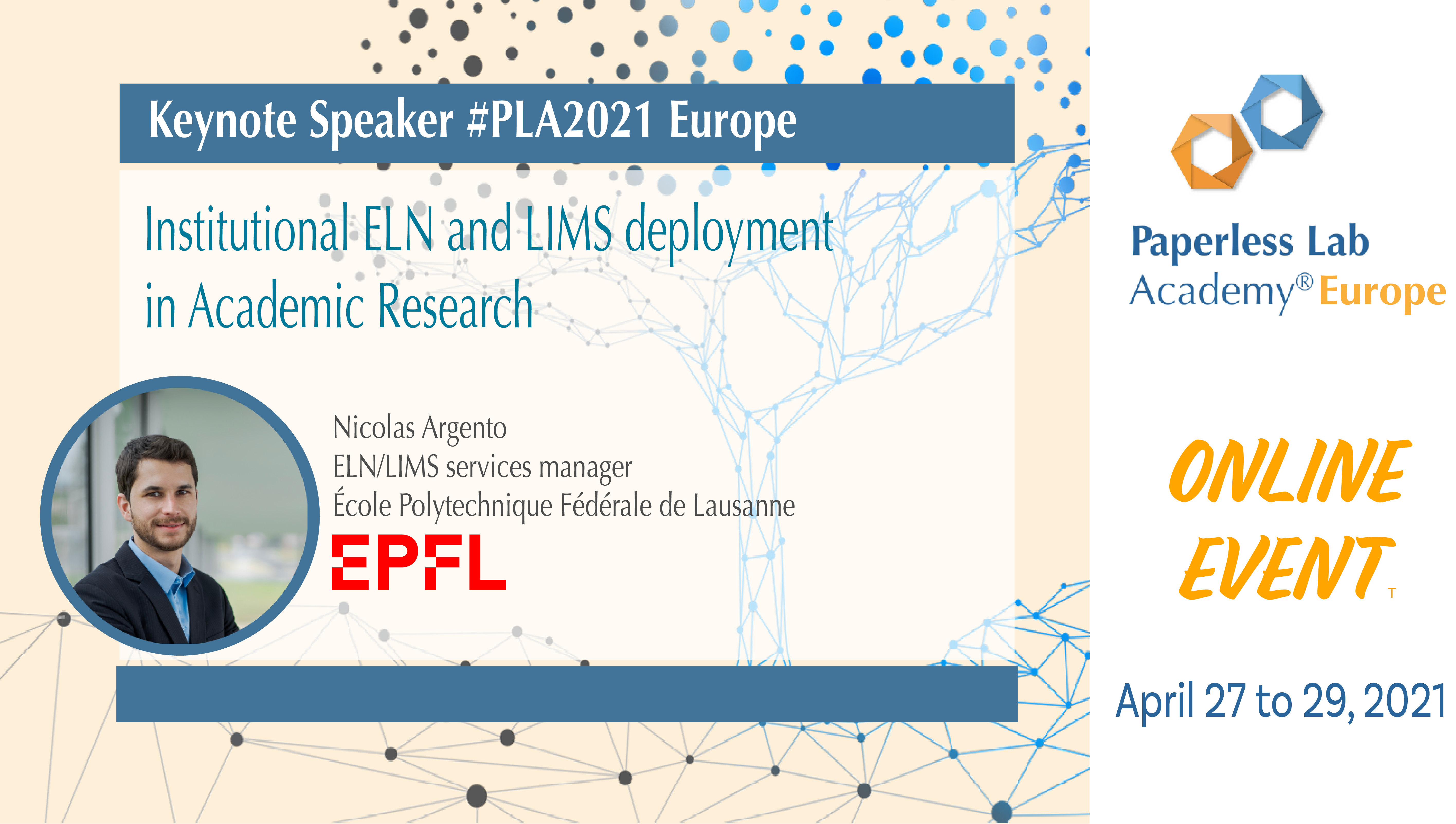EPFL Institutional ELN and LIMS deployment project in Academic research

At the PLA2021 Europe in April, we’ll have the great opportunity to listen to Nicolas Argento from the IT team at EPFL’s School of Life Sciences, who has recently published a paper on EMBO Reports, describing the six-year successful deployment of electronic laboratory notebooks (ELN) and a Laboratory Information Management System (LIMS).
The systematic recording and management of experimental data in academic life science research remains an open problem. EPFL engaged in a program of ELN and LIMS encountering a host of fundamental questions at the institutional level and in each single laboratory. The efforts were focusing in implementing a digital tool for tracking experimental data and facilitating services to researchers through ELNs and LIMSs. This institutional initiative has created a commodity for more than 50 laboratories mainly in the field of life Sciences.
During his presentation, Nicolas Argento will describe the resources , methodology, and the challenges encountered during the Process. Nicola will take su through the results obtained at each phase of the project and will share the key success factors that led the new tools to be adopted by more than 500 users.
Nicola explains that the success of the project was due to choosing a highly customisable platform. While it has allowed the labs to own and configure their particular information system, protecting the creativity and freedom of the research process, it was anyhow critical to reinforce the necessity of a data manager responsible for adopting good data-management tools and practices.
It makes tracking bench experiments, identifying samples, storage, tracking, and managing Standard Operating Procedures fairer and easier. The new practices show a positive impact in terms of research quality and efficiency by increasing data availability, reusability, and reproducibility of experiments in the life sciences.
Beyond researchers, the digital transformation also impacted the central services of the School’s institutes. As illustrated by this project, overcoming challenges raised by modern life sciences research require collaboration between IT and labs. “Enabling good research data management is possible, within the appropriate environment,” says Gaël Anex, Head of the IT Unit at the School of Life Sciences. “The main challenges aren’t technological anymore, they are managerial.”
 Presenter: Nicolas Argento, ELN/LIMS services manager at École Polytechnique Fédérale de Lausanne
Presenter: Nicolas Argento, ELN/LIMS services manager at École Polytechnique Fédérale de Lausanne
For the last 6 years, Nicolas has been transforming an ELN/LIMS project into a core service serving the research laboratories and technology platforms in an academic life sciences research institute. Focused on the added value for scientists and laboratory staff, he coordinated 55 LIMS implementations in a wide variety of laboratories. His team of 4 engineers ensure tailor made deployments, the maintenance and evolution of an in-house infrastructure. IT engineer by training, his previous experience was in IT project management in the banking industries. He decided to embrace an innovative training to specialised in IT for healthcare. Acting as a lead link between laboratories and IT departments, his expertise covers biology R&D, healthcare and telemedicine information systems as well as IT project and services management.
 EPFL, École Polytechnique Fédérale de Lausanne, is the most cosmopolitan of all European technical universities. It welcomes students, professors and researchers of more than 120 nationalities. With both a Swiss and international vocation, EPFL focuses on three missions: education, research and innovation. EPFL collaborates with an important network of partners, including other universities and colleges, secondary schools and gymnasiums, industry and the economy, politicians and the general public, in order to have a real impact on society. The School of Life Sciences fosters education, research and innovation at the interface of engineering and biology to advance the understanding of the living world and solve biomedical problems. Our 52 research laboratories are grouped into four institutes, with strong inter-institute connections providing an interdisciplinary environment stimulating innovative research. www.epfl.ch
EPFL, École Polytechnique Fédérale de Lausanne, is the most cosmopolitan of all European technical universities. It welcomes students, professors and researchers of more than 120 nationalities. With both a Swiss and international vocation, EPFL focuses on three missions: education, research and innovation. EPFL collaborates with an important network of partners, including other universities and colleges, secondary schools and gymnasiums, industry and the economy, politicians and the general public, in order to have a real impact on society. The School of Life Sciences fosters education, research and innovation at the interface of engineering and biology to advance the understanding of the living world and solve biomedical problems. Our 52 research laboratories are grouped into four institutes, with strong inter-institute connections providing an interdisciplinary environment stimulating innovative research. www.epfl.ch
Latest Posts
Key Topics of the PLA2024India
PLA2024India, 5th edition, promises a programme full of interactions and discussions. 4 focused sessions and 2 training workshops The main theme of #P
14 May 2024
Press Release: PLA® Conferences to partner with IA-Meetings for its 5th Indian Edition.
The Paperless Lab Academy® (PLA) is a leading conference about digital transformation of laboratory and quality processes. Above all, it is about mas
08 April 2024
The #PLA2024Europe programme aimed to highlight the importance of the human factor in digital transformation with several presentations and panel disc
19 March 2024

